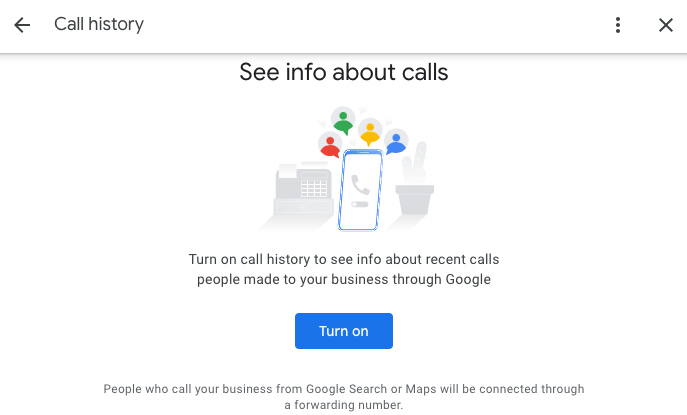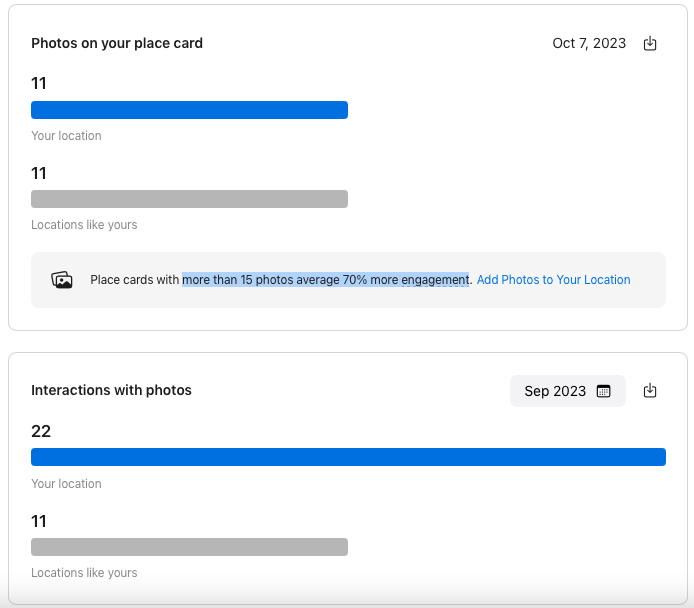Google Call History Returns, Fake Review Incentives, Apple Biz Connect Insights
Google's Call History has a checkered past including cancellation but its now back, The FTC claims that review platforms have perverse incentives to allow fake reviews, we agree and Apple Maps has updated their local Insights

GBP Call Tracking Back from the Wilderness
Daniel Boone allegedly once said: "I have never been lost, but I will admit to being confused for several weeks." That also seems to be the case with the Google Business Profile (GBP) call history/tracking feature. Apparently discontinued in July, it now appears available again in all its "experimental" glory. If not currently active, you select the "Call" button in the GBP search interface and then turn it on. If it's already on, you can see the history and phone numbers of the callers. Exactly why it was "discontinued" for two months is not clear. During that time users didn't see the button in the search interface and were unable to turn it off. Because it relied on a limited pool of tracking numbers, assigned and reassigned, calls often went to the wrong businesses. The idea of providing call tracking and better metrics is a good one; however, the implementation has left a lot to be desired. Perhaps during its two month "vacation," GBP call tracking has gotten its act together. You have to wonder, though, what business in their right mind would trust Google with a business critical feature like this ever again.

Our take:
- During the two month hiatus, Google left users half in and half out of the product with no way to turn if off or get metrics.
- In characteristic Google fashion, there were no end user communications about what was going on or why.
- If the product is finally fixed, good. But Google owes GBP users more than turning it off and on randomly – a major breach of trust.
Does Google Have 'Incentives' to Ignore Fake Reviews?
The FTC's statement above came in their Trade Regulation Rule on the Use of Reviews and Endorsements. Google clearly took offense and addressed the issue at length in their official comments, encouraging the FTC to go after review buyers and sellers instead. Google said it understands "fake reviews undermine users' confidence in the information available on our platform." It went on to assert, "The FTC should be focused on the bad actors perpetuating fake reviews, not the platforms working hard to stop them." If Google truly believed fake reviews (and listings) hurt trust, why did they ignore the issue for 15 years? Clearly, Google made the choice to not focus on these issues in any substantial way until recently. Disclosures in the Google antitrust trial clearly show its motivations go beyond "what's best for the user." I used to think Google was unwilling to apply necessary resources to an unsexy problem. And while I don't think there were direct economic incentives for Google to look the other way, there were probably anti-competitive reasons for doing so.

Our take:
- Google's playbook has been to throw everything at competitors: for example, adding listings to Maps to compete with Mapquest and maps to listings to compete with YPs.
- The same applies to reviews. Review volume is everything and fake reviews help in that battle. Given that reviews are infrequently read, they add to the patina of dominence without risking Google's reputation.
- Even allowing listing spam could be viewed as a technique to gain business' attention to the benefits of local marketing on Google.
Apple Maps' Peer Group Benchmarks
Apple Maps is now providing several new Insight metrics for some but not all locations. Called Peer Group Benchmarks, this new metric allows businesses, in theory, to compare themselves to similar businesses by search volume, photo views, photo interactions and location views. Unfortunately, Apple makes no effort to define or describe a "peer." Is it a business of the same size, the same category, in the same geography? Nor do they reveal whether these are the results of brand or category searches. It does somewhat more with photos. Apple suggests, based on the number of photos you have, how much increased engagement you'd see with more. Apple says that Place Cards with photos get over 10 times more engagement, and having 15+ photos results on average in 70% more engagement. Clearly Apple is attempting to get businesses more engaged with their listings and, as part of that, to add more photographs.

Our take:
- Apple is committed to bringing location-based businesses into the world of Apple Maps and attempting to offer some (albeit limited) benefits.
- This is a minor, incremental change, like many of Apple's changes. But it does reflect they're working towards a longer term goal.
- While Apple is distant second in driving local traffic, Maps could play an important role in spatial computing, on a future wearable or in-car.
Recent Analysis
- Near Memo episode 131: Bulk Dashboard comeback?, GBP listings cleanup, appetite for Google search alternatives
Short Takes
- GBP finally rolling out ability to edit social profiles broadly, although not to all profiles. It has come, gone and come again over the past 60 days.
- Here's how to close or remove a Google Business Profile.
- Yelp asks federal court to stop Texas suit to block "crisis pregnancy center" consumer warnings.
- Google testing a section titled "popular stores" for products available locally.
- While GM is abandoning Apple CarPlay, Porsche is embracing it.
- Local SEO: 17 Ways to Use Your Hours for Maximum Boom.
- Google SGE continues to evolve, company testing "SGE lite."
Listen to our latest podcast.

How can we make this better? Email us with suggestions and recommendations.
